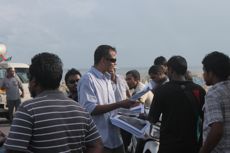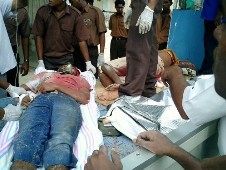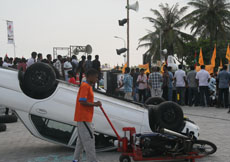A second investigation of the 2003 Maafushi Jail shooting has been launched by a special committee appointed by President Mohamed Nasheed and his cabinet.
The committee includes Housing Minister Mohamed Aslam, Attorney General (AG) Abdulla Muiz and Defence Minister Thalhath Ibrahim Kaleyfaan, and will investigate the incident that took place on September 20, 2003 – a watershed moment following the death in custody of Evan Naseem that led to street riots, the declaration of a state of emergency, and ultimately, the introduction of multi-party democracy and the eventual ousting of former President Maumoon Abdul Gayoom.
An investigation was previously conducted by a special commission under former President Maumoon Abdul Gayoom. The censored results were published in January 2004, and 12 prison guards were sentenced to death. Captain Adam Mohamed, the commanding official charged with ordering the shootings, was granted clemency by Gayoom. Subsequently, the sentence of the prison guards was commuted to 25 years in jail.
In June 2011, the case was re-opened and three of the former prison guards, who were living at large, were sent back to jail.
State Home Minister Mohamed Naeem previously told Minivan News that he regretted sending the convicted men back to prison after a long period without clear legal action.
“If [the former administration] had not freed them from prison, by now they would have served most of their sentence and could have even possibly applied for clemency,” said Naeem.
However, he did say that the action of the former administration had not only violated the rights of the convicted, but also those of the victims.
“When the victims who survived that time see these convicted people roaming around the streets, how do they feel? It is unfair for them,” he said at the time.
An individual who was imprisoned at Maafushi jail at the time of Evan Naseem’s death and the prison shootings spoke to Minivan News about the renewed investigation.
“I think they need to find out who ordered the torture of Evan Naseem–was it the highest ranking officer, or a lower officer? This has been delayed too long now. We have to have proper justice to move ahead,” he said.
The source added that a lot of information surrounding the incident had been censored, and said he wasn’t sure that “the right people” had been sent back to prison.
“I think it is wrong for the one who complied with the order to take the punishment. It should be the one who gave the order,” he said.
Former President Gayoom at the time was also Minister of Defence and National Security.
The former Maafushi prison guards involved in the shootings were recently re-arrested for the 2003 event. The source said several senior prison officials had informed him at the time that the order to shoot on September 20 had come from the top.
The shooting occurred after inmates broke out of their cells “to learn the details of fellow Evan Naseem’s death”, the source said.
The source told Minivan News that he could hear people being tortured from his cell, and that he had also heard these sounds on the night that Naseem died. His own cell was secure at the time of the riot.
“This army man was controlling us, and he said it was nothing. But we knew some things were happening. I knew, because I saw people jumping off the wall from my cell.
“When they opened the door to the block to bring the breakfast things we kept asking the guards what was happening but they would tell us nothing. Finally, we asked the guards to please open the gate so we could see, and at that time we saw a lot of people lined up on the beach in handcuffs. By the evening the army came and took control of things. Then, an inmate said ‘let’s burn this place down!’, but I said, ‘No, let’s work to get free. We are not going to burn the prison.’ I told him not to do anything, but he said ‘Let’s use [force].’ I said, ‘Let’s negotiate.’ So we negotiated.”
Following the shooting, 19 inmates and one officer were reported injured, and three inmates were reported dead. 15 of the 20 persons wounded had been shot above the knee.
An English translation of the initial investigation, provided by the Dhivehi Observer on January 24 2004, described the prison break as “not an emergency situation,” and determined that the use of weapons against the inmates was “neither a proportionate response nor a reasonable means of control.”
The report, which was filed by the former administration’s special commission, further stated that inmates were partially excused for the alleged riot “on account of the fact that they were acting on deep grief and frustration and did not appear to intend further harm [other] than demanding an investigation into Naseem’s death.”
Naseem “died due to grievous hurt caused to him by some personnel of Maafushi Jail Security System,” stated the report. The report further notes that inmates at Maafushi Jail had requested to meet with a security officer from the Department of Corrections several times after learning of Naseem’s death. Captain Adam Mohamed was assigned to this meeting, but chose to ignore it; he was the captain that the inmates confronted with their questions during the outbreak. The investigation report states that the captain “did not offer any reasonable response to those questions.”
CCTV recordings of the prison’s Operations Room and the block in which the initial outbreak took place had not been preserved for the investigation, and no Event Log Book had been used by officials, the report claimed.
Likes (0)Dislikes
(0)Dislikes (0)
(0)
 (0)Dislikes
(0)Dislikes (0)
(0)

